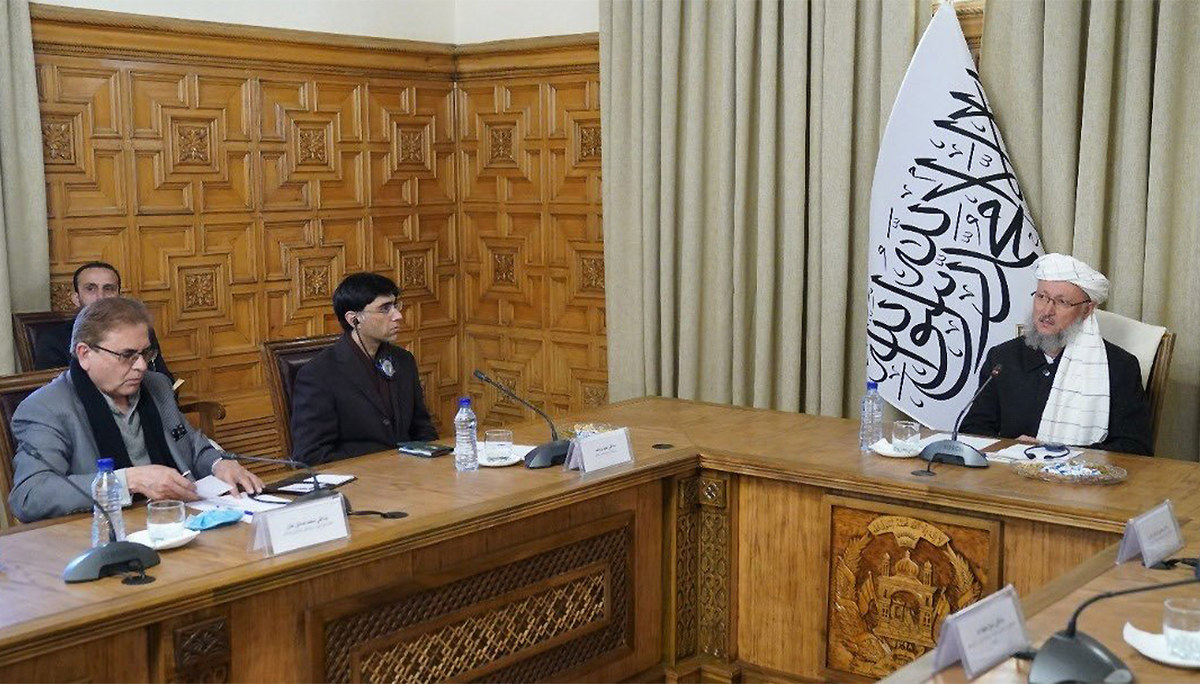ISLAMABAD: Pakistan and Afghanistan have agreed to devise a coordination mechanism to enhance facilitation at border crossings, the Pakistani premier’s office said on Sunday after the Pakistani national security adviser (NSA) concluded his two-day Kabul visit.
Pakistani NSA Moeed Yusuf’s visit yielded “substantive” results in terms of trade facilitation and social sector support, PM Imran Khan’s office said in a statement. It was aimed at discussing with the Afghan leadership the humanitarian requirements of the country and Pakistan’s proposals for deepening economic engagement to overcome the current challenges in Afghanistan.
Yusuf, during his two-day visit, called on Afghanistan’s Acting Deputy Prime Minister Mullah Abdus Salam Hanafi and Acting Foreign Minister Mullah Amir Khan Muttaqi to discuss the current situation in Afghanistan and strengthening of bilateral relations between the two countries.
“The visit yielded substantive outcomes in terms of forward movement on trade facilitation and social sector support,” the PM office statement read.
“Both sides agreed to establish a National Level Coordination Mechanism for enhancing facilitation at Border Crossing Points. They also agreed to initiate barter trade, modalities for which will be worked out immediately.”

Pakistan’s NSA Dr. Moeed Yusuf (second right) meets Afghanistan’s acting deputy prime minister Abdul Salam Hanafi (left) in Kabul, Afghanistan, on January 29, 2022. (Social media)
During the visit, Pakistan offered Afghanistan capacity-building and training support in multiple sectors, including health, education, banking, customs, railways and aviation, according to the statement.
Both sides reiterated their commitment to early completion of the three major connectivity projects, Central Asia-South Asia power project or CASA-1000, Turkmenistan–Afghanistan–Pakistan–India (TAPI) gas pipeline and the Trans-Afghan Rail project.
Pakistani and Afghan officials also emphasized their commitment to ensuring peace and stability in both countries.
NSA Yusuf’s visit came amid Pakistan’s appeals to the world to help avert a looming humanitarian crisis in Afghanistan.
The humanitarian situation in Afghanistan has deteriorated drastically since the Taliban’s takeover in August 2021. International aid came to a sudden halt and the United States has frozen $9.5 billion (8.4 billion euros) in Afghan central bank assets held overseas.
Hunger now threatens 23 million Afghans, or 55 percent of the population, according to the United Nations, which says it needs $5 billion from donor countries this year to address the humanitarian crisis in the country.
Pakistani PM Imran Khan earlier this month said there was an urgency for the international community to provide immediate humanitarian relief to millions of Afghans on the brink of starvation.
In December 2021, Pakistan hosted the 17th extraordinary session of the Organization of Islamic Corporation’s (OIC) Council of Foreign Ministers with a focus on the looming economic and humanitarian crisis in Afghanistan.
The OIC agreed to establish a Humanitarian Trust Fund to channel assistance to Afghanistan, appoint a special envoy and work together with the United Nations (UN) in Afghanistan.














